Students enrolled in Professor Julie Lellis’ Senior Seminar in Health Communications spent the spring semester developing campaign ideas to support the healthcare system’s initiatives in health equity and employee wellness.
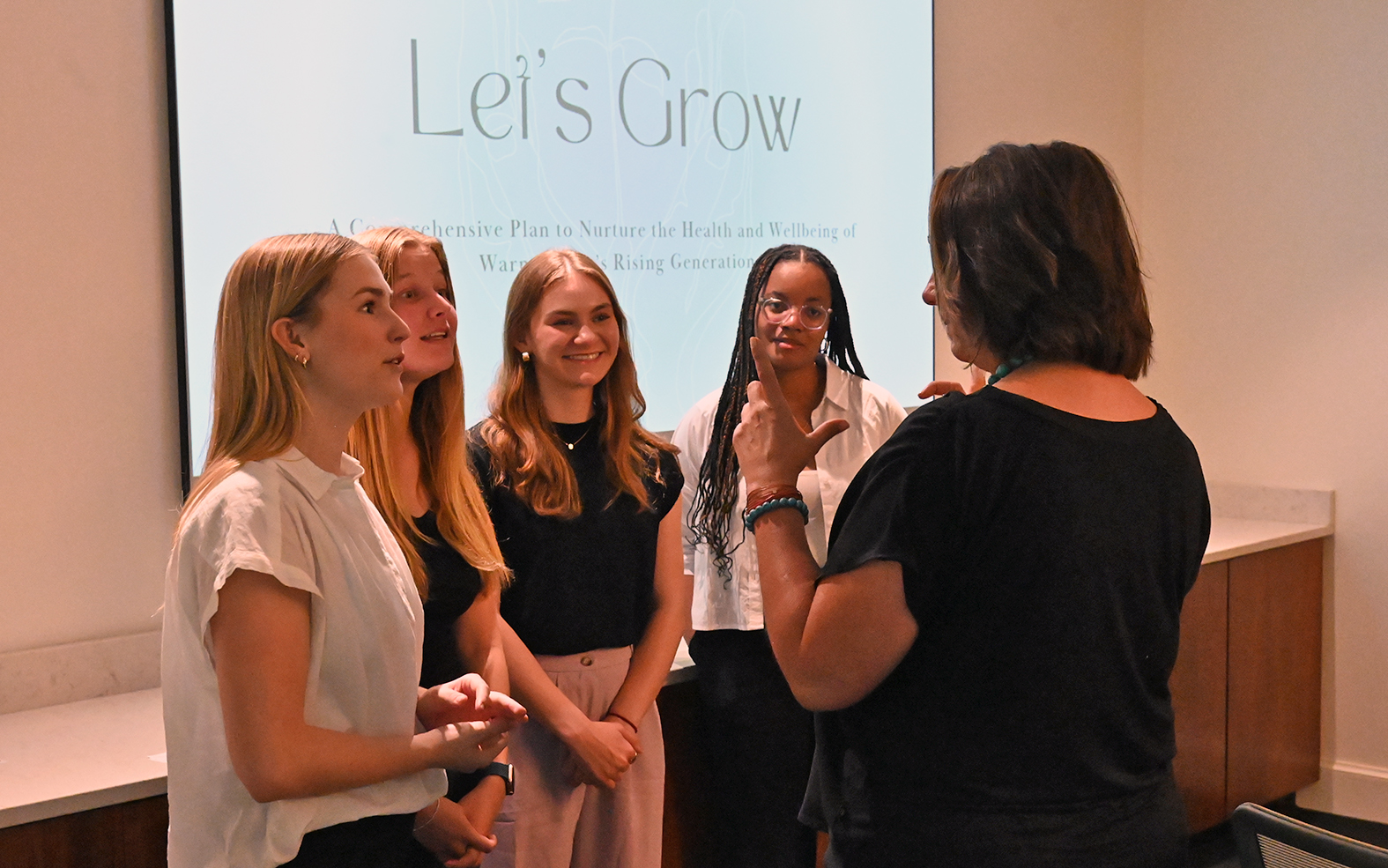
The first year of the Health Communications minor concluded this spring during finals week in the second-floor conference room in Schar Hall – the room with the picturesque view overlooking the university’s Historic Neighborhood.
A group of representatives from Cone Health, including Megan Curling ’23, an Elon Year of Service Fellow, gathered around the room’s elongated, glass-topped conference table to hear from the eight students enrolled in Professor Julie Lellis’ Senior Seminar in Health Communications.
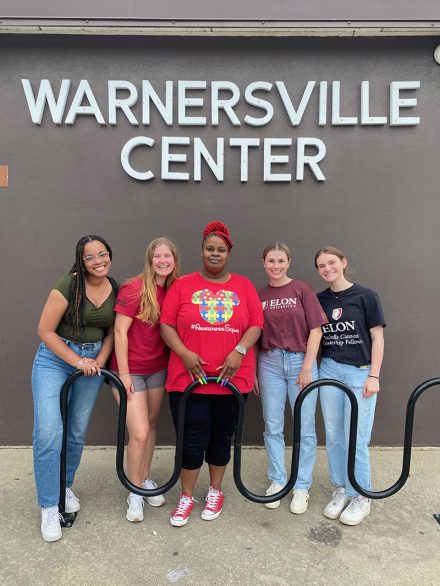
As part of the new minor’s culminating course, the students – divided into two groups – shared details about their respective semester-long projects: a far-ranging campaign to promote health equity in a low-income neighborhood in East Greensboro and an effort aiming to increase participation in Cone Health’s employee wellness programs. The student groups were tasked with developing and presenting evidence-based health communications strategies that could improve the initiatives supported by the expansive North Carolina-based healthcare system.
“Our overarching objective with the university’s new Health Communications minor is to prepare students to communicate health-related information in a way that inspires positive behavior change,” said Lellis, the minor’s program coordinator. “And what better way to prepare students than through client work, where students can work on real issues similar to the ones they’ll encounter as health communicators. Undoubtedly, this preparation will help them transition to a job field that is seeing tremendous growth and an industry that needs communications support.”
For Cone Health, the partnership provided the organization with new ideas thanks to a fresh set of eyes, explained Jen Nixon, Cone Health’s director of health equity.
“Bringing the Health Communications students into the community-building work happening in east Greensboro was a catalyst. They brought a fresh perspective, energy and enthusiasm to the project,” she said.
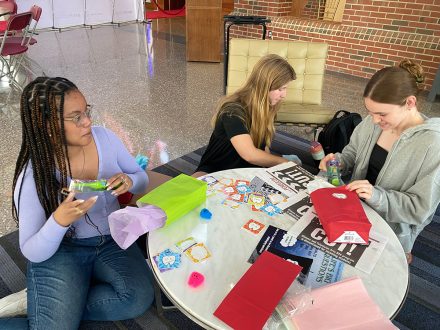
To see photos of the student presentations, visit the School of Communications’ Flickr account.
For the course’s Let’s Grow campaign, a group of students developed a comprehensive plan to nurture the health and wellbeing of children in the Warnersville community, one of the first planned Black communities in the Triad. With support from Nixon, the students – Ella Arnold ’24 (project director), Savanna Carr ’25, Bria Wurst ’25 and Symone Dill-White ’25 – were tasked with supporting the growing partnership between the Center for Health Equity at Cone Health and a community in East Greensboro with significant health disparities.
To kick off their project, the students explored the rich history of the Warnersville community and analyzed data collected on community health needs that could be met through programming at the community’s recreational center. For more background, the students attended a Wellness Wednesday event at St. Phillip AME Zion Church, which is led by a congregational nurse through a partnership with Cone Health, where community members discussed their concerns about heart health. Additionally, the students visited the church’s community peace garden, one of two gardens in the neighborhood focused on mutual aid. The experiences provided the students with a better understanding of health needs in the community and how health information is shared.
Their findings indicated a strong community interest in programs for youth ages 5-12, and the student group developed a campaign that focused on physical, mental and dental health.
Based on their research, the students learned that dental health was the top health concern reported by the community. With support from a $1,000 grant from the Kernodle Center for Civic Life, the students implemented one of the modules they proposed as part of “Let’s Grow! Our Smiles.” The student team led an evidence-based education session for the afterschool program at the neighborhood’s recreation department. Young community members were provided “Happy Teeth” kits with electric toothbrushes, floss picks and toothpaste.
In direct response to community needs, students also used grant funding to purchase blood pressure cuffs for the rec center and the church, as well as garden supplies. The students presented the Center for Health Equity at Cone Health with a 44-page report that summarized their research and showed how their four-part plan could be implemented in the community.
“I commend our students for not only brainstorming and developing a well-rounded campaign, but they also embraced this underserved community to better understand what its needs were,” Lellis said. “In turn, the community embraced them back. As a result, they put their plans into action and were able to supply children with the instruction and tools needed to promote good dental health – one of the issues the community members singled out as a challenge. The students should take a great deal of pride in their efforts.”
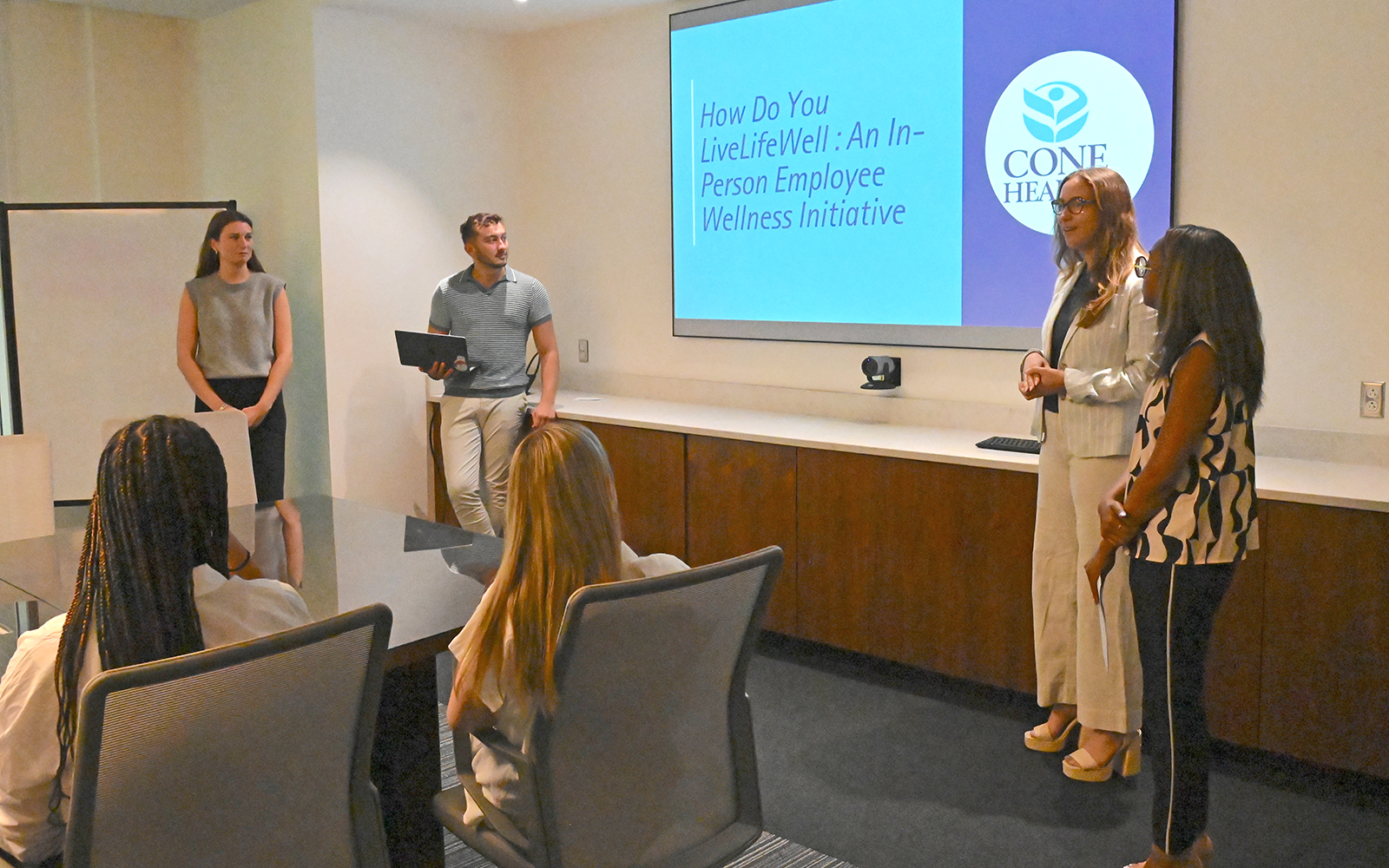
Maya Drabczyk ’24, a public health studies major with a health communications minor, served as the project manager for the course’s LiveLifeWell group, which generated new ideas for Cone Health’s employee wellness program. Drabczyk teamed with classmates Nate Hudson ’24, Leah Short ’24 and Annabelle Gillespie ’24 to conduct research on the history of workplace wellness and examined strategies for disseminating health information effectively to employees.
The students discovered one reason for low participation is that lower-wage workers may work nontraditional hours or have limited access to computers to utilize online wellness content. As a result, the students focused on enhancing in-person opportunities and building community around wellness activities at work.
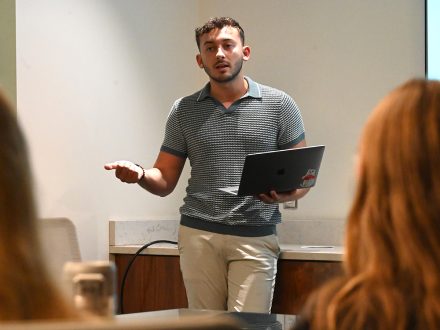
Thanks to Cone Health’s assistance, especially Alamance Regional LifeStyle Center Director Jamie Athas, the students had access to employee wellness data, which helped the brainstorming process on how to enhance employee wellness and identify areas for improvement.
“Success in projects like this can be difficult to measure since we are providing the client with recommendations,” Drabczyk said. “But I believe that our team was successful. Throughout the semester we created objectives, strategy recommendations, and deliverables that have the potential to increase employee engagement.”
Drabczyk, who will continue her education this fall at the Geisel School of Medicine at Dartmouth, pursuing a Master of Public Health, explained that her group’s work with Cone Health was an invaluable learning experience.
“Speaking for my team, I believe that the most important message that we learned from working with a real- world client – such as Cone Health – is to expect pivots and embrace change,” Drabczyk said.
Admittedly, she said her group’s initial problem statement missed the mark, and the students had to better educate themselves on what Cone Health desired and how they could better meet the organization’s needs.
“At the start of working with our clients, we viewed pivots as obstacles,” Drabczyk said. “However, as we learned more, we began to see them as opportunities to make our campaign stronger.”


